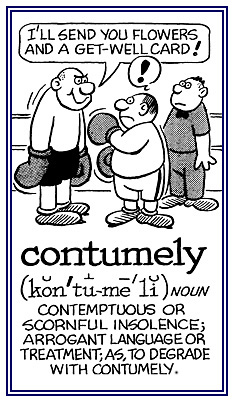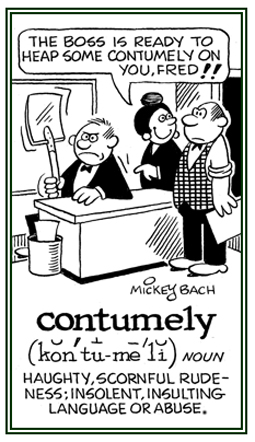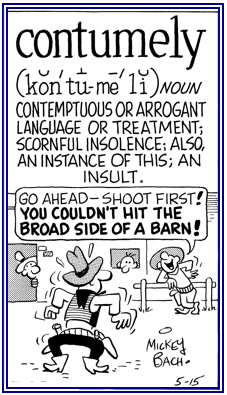com-, co-, cog-, col-, con-, cor-
(Latin: together, together with, with)
The prefix com- is assimilated to co- before h, w, and all vowels:
The prefix com- becomes, cog- before g: cognition, [co + gnoscere, "to know"], et al.
The prefix com- becomes, col- before l: colloquial, et al.
The prefix com- becomes, con- before c, d, g, j, n, q, s, t, v: covivant, et al.
The prefix com- becomes, cor- before r: corrigible, et al.
The words for this unit show cartoons for all of the examples of the com-, co-, cog-, col-, con-, cor- entries; however, there are many more of them which exist in other units which are available when you type in a particular word in the search box at the bottom of this page.
2. To argue in a debate or in a controversy; to dispute: Jack and Frank contend that the reasons for providing a big theater in their village are wrong because there are only 200 inhabitants and the theater would cost a great deal of money to construct!
3. To compete in a competition to win something: Mike's high school basketball team will contend for the basketball championship next Friday.
4. To hold to a fact; to assert as being accurate: Ted's secretary was competent enough to contend that the contents in the minutes which she wrote during the last meeting were correct and that she didn’t make any mistakes.
5. Etymology: used from about 1440; from Latin contendere, "to stretch out, to strive after"; from com-, "with, together" + tendere, "to stretch".
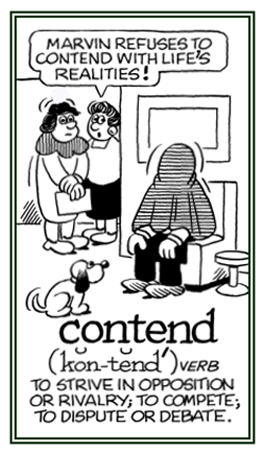
Go to this Word A Day Revisited Index
so you can see more of Mickey Bach's cartoons.
2. A statement or point that one argues for as being true or valid, even when it is not: The school principal’s assertion, or contention, that all of the students in his school were non-smokers was absolutely false!
3. Etymology: usage started in about 1382, from Old French contention, from Latin contentionem, from the stem of contendere, "to stretch out, to strive after", from com-, "together" + tendere, "to stretch".
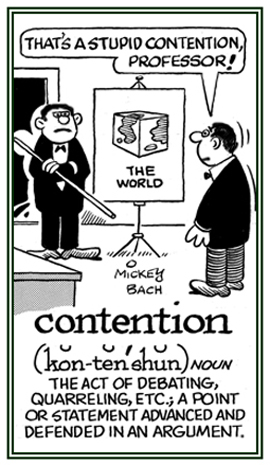
Go to this Word A Day Revisited Index
so you can see more of Mickey Bach's cartoons.
2. Pertaining to something which causes, or is likely to cause, disagreements and disputes between people with differing views: The superintendent told his secretary that it must be possible to reword the statement in a less contentious way.
3. Characterizing an issue or a subject matter which involves a dispute or is controversial: Lenora was convinced that it would be wise to avoid such a highly contentious topic as politics during dinner.
4. Descriptive of something which involves frequent and enjoyable arguments and disputes: After a contentious debate, members of the committee finally overwhelmingly voted to approve the funding for the financial loans.


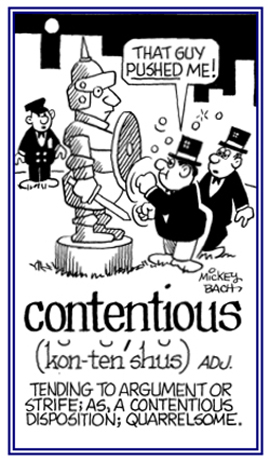
Go to this Word A Day Revisited Index
so you can see more of Mickey Bach's cartoons.

Go to this Word A Day Revisited Index
so you can see more of Mickey Bach's cartoons.


Go to this Word A Day Revisited Index
so you can see more of Mickey Bach's cartoons.
2. To be directly opposed to a statement or an action; to go against: Jim's mother was contradicting herself because; first she said that he could go to the movies with his friends, then she said he could not go!
3. Etymology: from Latin contradicere, "to speak against"; from contra-, "against, opposite" + dicere, "to speak, to say".
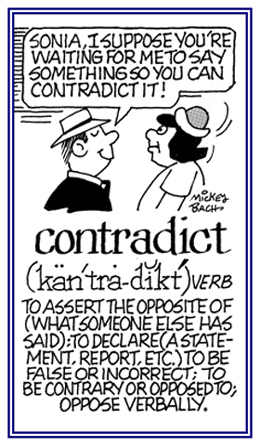
Go to this Word A Day Revisited Index
so you can see more of Mickey Bach's cartoons.
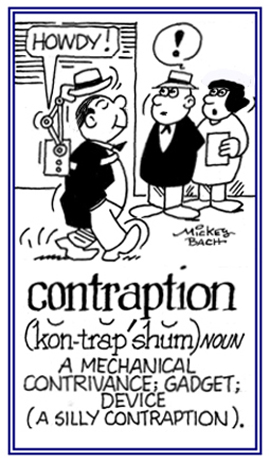
Go to this Word A Day Revisited Index
so you can see more of Mickey Bach's cartoons.
2. A mishap or embarrassing occurrence: Contretemps can take place during a ballet when a dancer stumbles or slips by mistake.
3. Etymology: from French : contre-, against which came from Latin contr-, "against" + tempus, "time"; literally, "against the time".


Go to this Word A Day Revisited Index
so you can see more of Mickey Bach's cartoons.
2. Crushed or broken in spirit by a sense of sin, and so brought to complete penitence: Grace, the contrite member of the church, confessed to her minister about the sinful act that she had committed when she stole a book from the library.
3. Etymology: from Latin contritus; literally, "worn out, ground to pieces", past participle of Latin conterere, "to grind"; from com-, "together" + terere, "to rub".
Literally, bruised, crushed; worn, or broken by rubbing.


Go to this Word A Day Revisited Index
so you can see more of Mickey Bach's cartoons.
2. Sorrow or affliction of mind for some fault or injury that has been done; specifically, penitence for sin: Mary's tears of contrition for neglecting her mother's birthday were sincere.
3. Etymology: from Latin terrere, "to rub"; literally, the action of rubbing things together, or against each other; grinding, pounding or bruising (so as to pulverize).
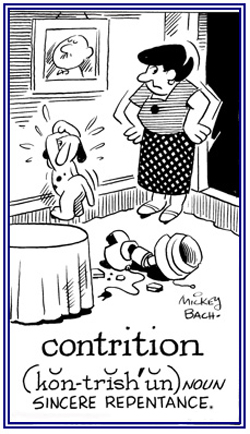
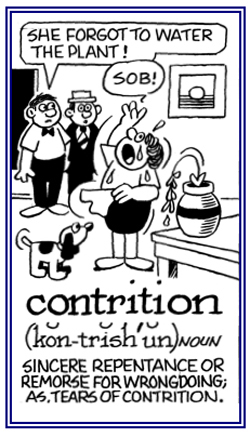
Go to this Word A Day Revisited Index
so you can see more of Mickey Bach's cartoons.
2. Something or an idea created in a clever way to accomplish an objective: The manager of the store thought up a contrivance to encourage customers to buy the store's tea products, like serving hot tea to the customers on cold winter days.
3. Etymology: from Middle English contreven, from Old French controver, contreuv-, from Medieval Latin contropare, "to compare"; from Latin con-, "together, with" + Latin tropus, "turn, manner, style"; from Greek tropos, "turn, manner, mode, style".

Go to this Word A Day Revisited Index
so you can see more of Mickey Bach's cartoons.
2. To invent or to produce an activity in a clever or unusual way: For the theater performance in school, the students contrived a background of the presentation by using some sheets and drawing on them in order to present the illusion of a forest.
The building contractor contrived a house small enough for Ted's budget, but big enough for four people to live in comfortably.
3. To cleverly devise something; such as, a mechanism to achieve an objective; especially, by improvising or inventing, composing, or performing with little or no preparation: Janet looked in the shed to see if she could find some ropes and wood to contrive a swing for the children when they were in the backyard.
4. To plan carefully so as to seem unnatural, artificial, or forced: The plot of the novel was so contrived that it didn’t seem to be realistic at all, but quite unfeasible and difficult to understand.
5. To make a deceitful plan that is intended to avoid being noticed by others: Stuart contrived a method to cheat while taking a test at school so his teacher wouldn’t notice by writing down some answers on the palm of his hand!
6. Etymology: from Old French controver and Modern French controuver, "to find out, to contrive, to imagine"; from Late Latin contropare, "to compare", from Latin com-, "with" + tropus, "song, musical mode"; from Greek tropos, "turn, direction, turn or figure of speech" related to trope, "a turning" and trepein, "to turn".


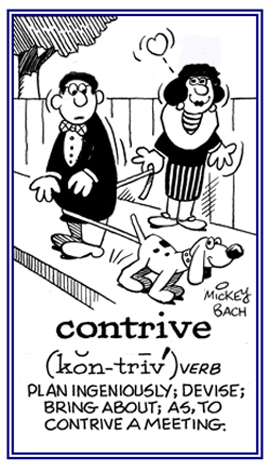
Go to this Word A Day Revisited Index
so you can see more of Mickey Bach's cartoons.
2. Descriptive of willfully not following the legal orders or summons of a court: Bert's contumacious refusal to appear in court to testify has resulted in his going to jail.
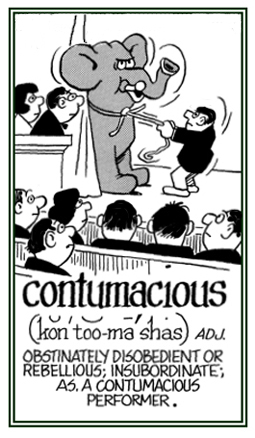



Go to this Word A Day Revisited Index
so you can see more of Mickey Bach's cartoons.
2. Conveying a scornful and insulting behavior: Mrs. Balderson sent James to the principal’s office because of his contumelious treatment of his classmates even though he had already been scolded by his teacher a few times that day.
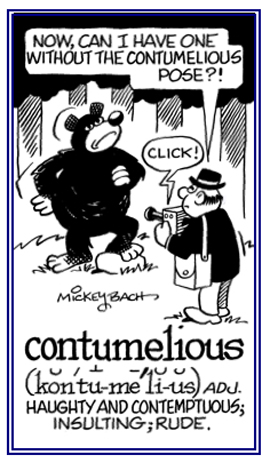
Go to this Word A Day Revisited Index
so you can see more of Mickey Bach's cartoons.
A contumely remark is a short, cutting expression that contains blunt words.
2. Etymology: from Old French contumelie, which came from Latin contumelia, "a reproach, an insult"; it is probably related to contumax, "haughty, stubborn"; from com-, "together, together with" + tumere. "to swell up".